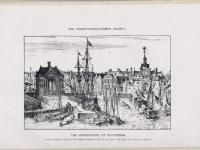Students will read excerpts from a primary source, Gottlieb Mittelberger’s Journey to Pennsylvania in the Year 1750 and Return to Germany in the Year 1754, a detailed travel account of a German musician from Wurtemberg to Philadelphia. Students will learn about the length of a trans-Atlantic journey, the conditions on the ship, the people who journeyed together, and their reception in Philadelphia. Students should also think about why Mittelberger may have presented such a negative view of immigration to Pennsylvania and about the difficulties in making the decision to leave one’s home. By reading Mittelberger’s first-hand account of his journey from Germany, students will understand the hardships faced by early immigrants, the rewards they looked for, and the tragedies that could occur along the way.
A Warning for Travelers to Colonial Pennsylvania
A Warning for Travelers to Colonial Pennsylvania
Essential Questions
Objectives
Students will be able to:
- Comprehend the hardships faced by immigrants traveling to the New World during the eighteenth century by interpreting primary source documents in the direct reading activity.
- Recognize how immigration patterns changed over time and why patterns changed by examining records of German immigration to Pennsylvania.
- Identify different reasons why people immigrated to the colonies and the types of people who made the journey by analyzing primary source material to consider the ethnic tensions between different groups in the Colonies.
Primary Sources
Other Materials
Suggested Instructional Procedures
- Assign reading, “Gottlieb Mittelberger’s Journey to Pennsylvania” with Worksheet 1 (Directed Reading Activity).
- Review answers to Comprehension Questions on Worksheet 1.
- Lead class discussion of Critical Thinking Questions on Worksheet 1.
- Students should understand that all sources have biases that historians try to discern in order to assess the strengths and weaknesses of a source.
- Ask students what they think would be the hardest part of leaving their home country. Would they leave under the same circumstances as Mittelberger? Why or why not?
- Ask students if they would like to contribute any personal stories of family members who left native countries to come to America. Ask them to compare their family’s experiences with Mittelberger’s
- As a wrap-up and assessment, verbally or in writing, have students consider what types of information they should include in their journal.
Vocabulary
Artisan: a skilled laborer or craftsman
Custom-house: Government building or office where customs (taxes) were collected and ships were cleared for entering or leaving a country
Dysentery: An inflammation of the intestines. Symptoms included extreme diarrhea, high fever, and severe pain and was usually caused by poor sanitation
Florin: A gold coin and form of currency
Forty-Eighters: Germans who immigrated to the United States after the failure of the Revolutions of 1848. They tended to be educated, middle class, and anti-slavery
French and Indian War: A conflict between France and Great Britain in their North American colonies. The war began in 1754 but later spread to Europe where it was known as the Seven Years War (1756-1763)
Indenturing: A process of contracting labor for a set number of years in exchange for passage across the ocean
Lutheran : The largest Protestant denomination in Germany who followed teachings of Martin Luther and stressed education and justification through faith alone
Mennonites: A religious sect who followed the teachings of Menno Simon (1492-1559). They believed in simplicity of food and life, separation of church and state, and refused to bear arms or serve in the military. They were closely related to the Amish
Newlander: An agent commissioned by shipping companies to convince people to settle in America
Principality: A sovereign state ruled by a prince or princess
Redemptioner: A person who agreed to serve usually three to seven years in the colonies in exchange for transportation. At the end of the term, the person was released from his or her obligations and awarded all the rights of a free citizen. Redemptioner was sometimes called indentured servant
Scurvy: A disease caused by vitamin C deficiency. The symptoms included spongy and bleeding gums and general weakness and was usually caused by lack of fresh fruit and vegetables
Thirty Years’ War (1618-1648): A war mostly fought in Germany between Protestants and Catholics but involved many European nations including the Holy Roman Empire, France, and Sweden. The war was started by German Protestant princes who resisted the authority of the Holy Roman Empire and ended with the Peace of Westphalia
Traffickers: People who dealt in buying and selling humans and/or their labor
Related Resources for Students

Plans in this Unit
Grade Level
Duration
Standards/Eligible Content
About the Author
This unit was created by Hannah Kim. Updated for SAS by Clara McGrath and Danielle J. Gross, Education Interns, Historical Society of Pennsylvania.
Attention Teachers!
Let us know how you used this plan and be featured on our site! Submit your story here.


